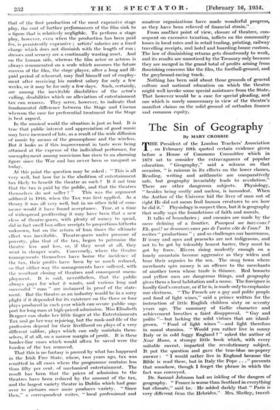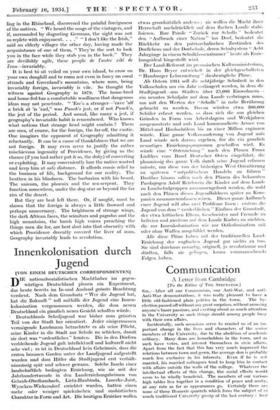The Sin of Geography
By MARY CROSBIE THE President of the London Teachers' Association . on February 10th quoted certain evidence given before a House of Commons Committee which in 1879 sat to consider . the extravagances of popular education. "Geography," said a witness on that occasion, "is ruinous in its effects on the lower classes. Reading, writing and arithmetic are comparatively safe, but geography invariably leads to revolution." There are other dangerous subjects. .Physiology, "besides being costly and useless, is immodest. When the Author of the Universe hid the liver of man out of sight He did not mean frail human creatures to see how he did it." Physiology is suspect then, but it is geography that really saps the- foundations of faith and morals.
It talks of boundaries ; and enemies are made by the mere defining of a frontier. Pourquoi me tuez-vous.? Eh, quoi! ne demeurez-vous pas de rautre cote de reau? It recites" productions " ; and so challenges our barrenness. If ivory and apes and peacocks are not indigenous, and not to be got by tolerably honest barter, they must be got by force. Rivers rising modestly enough on a lonely mountain become aggressive as -they widen and bear their argosies to the sea. The snug town where merchants spin money is an offence to the merchants of another town whose trade is thinner. Red bonnets and yellow men are dangerous things, and geography gives them a local habitation and a name. The foreigner is hardly God's creature, or if he is, is made only to emphasize our electness. "The -French are a gay and polite people and fond of light wines," said a primer written for the instruction of little English children sixty or seventy years ago. The summary of Gallic character and achievement breathes a faint disapproval. "Gay and polite "—but lacking the solid virtues that are island- grown. "Fond of light wines "—and light therefore in moral stamina. "Would you rather live in sunny Italy or in cold foggy England ? " asked the author of Near Home, a stumpy little, book which, with every suitable caveat,' imparted the revolutionary subject. It put the question and gave the true-blue no-Popery answer : "I would rather live in England because the Bible is' read 'there, but in Italy the Pope -.."prevents that somehow, though I forget the phrase' in. which the fact was conveyed. • Dr. Samuel Johnson had- an inkling of the dangers of geography. "France is worse than Scotland in everything but climate," said he..- He-_ added darkly that." Paris is very different from the Hebrides." Mrs–Shelley; travel- ling in the Rhineland, discovered the -painful foreignness of the natives. "We heard the songs of the vintagers, and if, surrounded by disgusting Germans, the sight was not so replete-with enjoyment. . . ." "I don't like the Irish," said an elderly villager the other day, having made the acquaintance of- one -of them, "They're the sort to look you in the face while they stab you in the back." They are devilishly agile, these _ people' de rautre cdtg de reau—invariably.
It is best tb sit veiled on your own island, to crow on your own dunghill and to roam not even in fancy on coral strands and Greenland's mountains, where man, being invariably foreign; invariably is vile. - So thought the Witness against Geography in 1879. The home-bred and home-fed has -a comfortable woolliness that dangerous ideas may .not penetrate. " 'Ere's a stranger—'eave 'alf a brick at 'is 'cad," was Punch's jest, or if not Punch's, the jest of the period. And sound, like many a jest, if geography's invariable habit is remembered. Who knows what notions that strange head might contain ? There are uses, of course, for the foreign, the far-off, the exotic. One imagines the opponent of Geography admitting it reluctantly. It can be a cause of thankfulness that we arc not foreign. It may even serve to justify the rather mischievous ingenuity of Providence, by giving us the chance (if you had rather put it so, the duty) of converting or exploiting. It may conveniently lure the native wastrel and keep him at safe distance. It affords comic relief to the business of life, background for our reality. The heathen in his blindness. The barbarian with his beard. The unicorn, the phoenix and the sea-serpent. They function somewhere, under the dog-star or beyond the far rim of the desert.
But they are best left there. Or, if sought, must be shown that the foreign is always a little froward and perhaps. unnecessary. The brightness of strange wings, the dark African faces, the scimitars and pagodas and the high mountains, the harsh high voices preaching the things men die for, are best shut into that obscurity with which Providence decently covered the liver of man. Geography invariably leads to revolution.









































 Previous page
Previous page